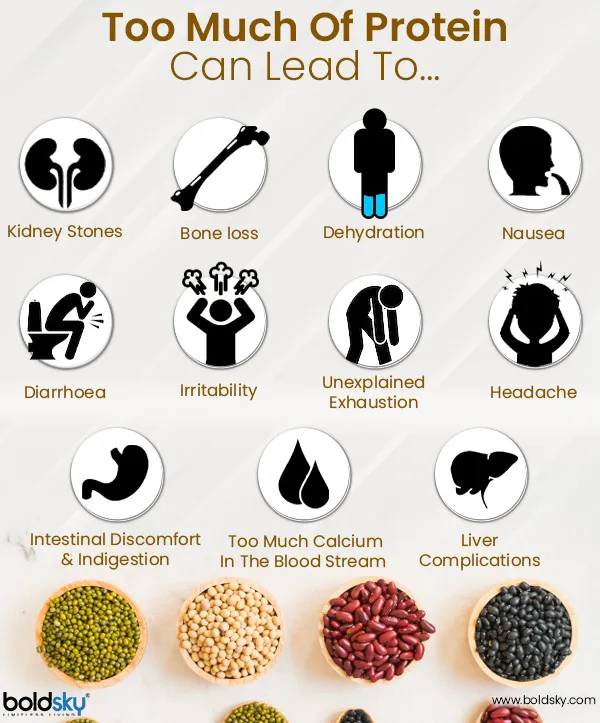In the world of health and fitness, few topics spark as much debate as protein consumption. From gym enthusiasts to nutrition experts, opinions on the optimal intake vary widely. But amidst the conflicting advice, one question looms large: how much protein is too much? Let’s dive into this contentious issue to uncover the truth behind the great protein debate.
Key Takeaways
- Protein is essential for muscle repair, growth, and overall body function, but excessive intake can have adverse effects.
- The Recommended Dietary Allowance (RDA) for protein is around 0.8 grams per kilogram of body weight per day for adults.
- Active individuals engaged in regular exercise may require higher protein intake, typically ranging from 1.2 to 2.2 grams per kilogram of body weight per day.
- Excessive protein consumption can strain the kidneys, increase the risk of dehydration, and lead to nutrient deficiencies if not balanced with adequate hydration and a variety of nutrient-rich foods.
- High-protein diets, especially those rich in animal protein, may impact bone health and digestive function if not part of a balanced diet.
- Strive for moderation and variety in protein sources, including lean meats, poultry, fish, eggs, dairy, legumes, nuts, and seeds.
- Listen to your body’s signals and adjust your protein intake based on individual factors such as age, gender, activity level, and metabolic rate.
- Consult with a healthcare provider or registered dietitian for personalised guidance on protein intake and overall nutrition to support your health and fitness goals.
Understanding Protein
Protein is often hailed as the building block of life, playing a crucial role in muscle repair, growth, and overall body function. Found in foods like meat, fish, eggs, dairy, and plant-based sources such as beans and legumes, protein is essential for maintaining a healthy body composition and supporting various metabolic processes.

Recommended Protein Intake
The Recommended Dietary Allowance (RDA) for protein varies depending on factors such as age, sex, weight, and activity level. However, the general guideline for adults is around 0.8 grams of protein per kilogram of body weight per day. For example, a sedentary individual weighing 70 kilograms would require approximately 56 grams of protein daily.
Protein Needs for Active Individuals
For individuals engaged in regular exercise or strength training, protein requirements may increase to support muscle repair and growth. Many fitness enthusiasts and athletes aim for higher protein intake, typically ranging from 1.2 to 2.2 grams per kilogram of body weight per day, depending on training intensity and goals.
The Risks of Excessive Protein Consumption
While protein is essential for optimal health, consuming too much can have adverse effects on the body. Excessive protein intake can strain the kidneys, leading to potential kidney damage or kidney stones, especially in individuals with pre-existing kidney conditions. Additionally, high-protein diets may increase the risk of dehydration and nutrient deficiencies if not balanced with adequate hydration and a variety of nutrient-rich foods.

Impact on Bone Health
Another concern associated with high protein intake is its potential impact on bone health. Some studies suggest that diets high in animal protein, particularly red and processed meats, may leach calcium from the bones, potentially increasing the risk of osteoporosis or bone fractures. However, more research is needed to fully understand the relationship between protein consumption and bone density.
Digestive Issues
Excessive protein intake can also lead to digestive issues such as constipation, bloating, and discomfort. This is particularly common when consuming large quantities of protein supplements or processed protein-rich foods, which may contain additives or artificial ingredients that disrupt digestive function.
Finding Balance
So, how can individuals strike the right balance when it comes to protein consumption? The key lies in moderation and variety. Instead of fixating on high-protein diets or excessive supplementation, focus on incorporating a diverse range of protein sources into your meals, including lean meats, poultry, fish, eggs, dairy, legumes, nuts, and seeds.
Listen to Your Body
Ultimately, the ideal protein intake varies from person to person based on individual factors such as age, gender, activity level, and metabolic rate. Rather than adhering strictly to generic guidelines, listen to your body’s signals and adjust your protein intake accordingly. Pay attention to how different protein sources make you feel and strive for a balanced diet that meets your nutritional needs without overdoing it on protein.
Consult a Professional
If you’re unsure about your protein requirements or have specific health concerns, consult with a qualified healthcare provider or registered dietitian. They can offer personalised guidance based on your unique circumstances and help you develop a nutrition plan that supports your overall health and fitness goals.
Conclusion:
In the great protein debate surrounding protein consumption, finding the right balance is key. While protein is undeniably important for muscle repair, growth, and overall health, excessive intake can pose risks to kidney function, bone health, and digestive wellness. By prioritising moderation, variety, and individualised nutrition, you can harness the power of protein to support your health and fitness journey without falling prey to the pitfalls of excess. So, remember to fuel your body wisely, listen to its cues, and strive for a balanced approach to protein intake that promotes long-term well-being.





